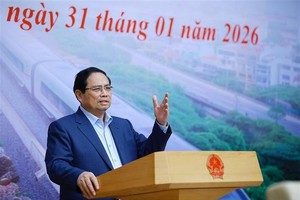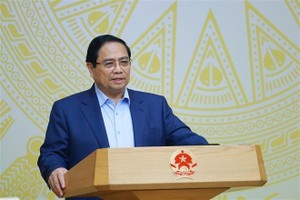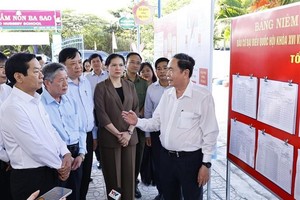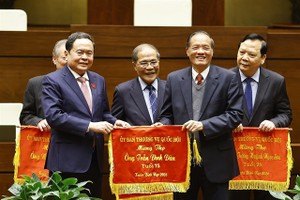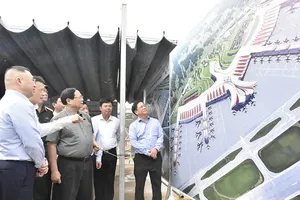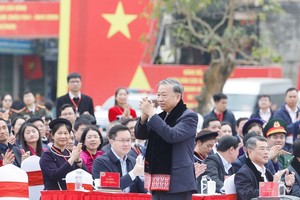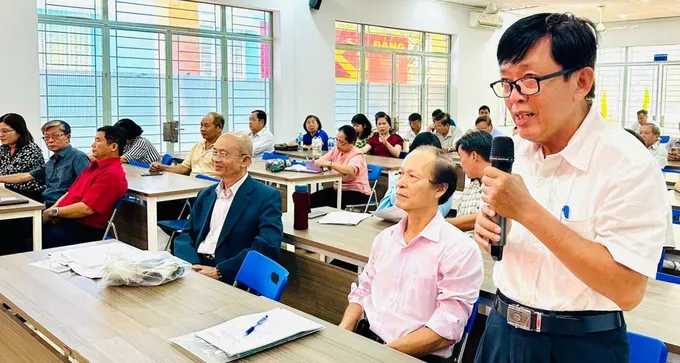
A key proposal within the draft Resolution amending the 2013 Constitution involves revising Article 9. The amended article would specify that the Vietnam Trade Union, Vietnam Farmers’ Union, Ho Chi Minh Communist Youth Union, Vietnam Women’s Union, and Vietnam Veterans’ Association are socio-political organizations affiliated with the Vietnam Fatherland Front (VFF).
This particular phrasing has elicited considerable discussion and some lingering apprehension regarding the precise nature of the relationship between these socio-political organizations and the VFF, especially concerning the balance between enhancing operational effectiveness and preserving the distinct independence and creativity of each entity.
Chairman Do Van Chien of the VFF Central Committee explained that the term “affiliated with” accurately reflects the current operational dynamics and the ongoing restructuring of the political apparatus. He noted its consistency with the Politburo-approved plan concerning the functions, responsibilities, and organizational framework of the VFF at the central level.
Member organizations, he clarified, will continue to hold their own congresses, maintain their individual charters, seals, and separate accounts, and operate according to their specific mandates. Functions that exhibit overlap among these organizations will be consolidated under specialized committees of the VFF, a move intended to reduce redundancy and enhance overall operational efficiency.
Vice Chairwoman cum Secretary General of the VFF Central Committee Nguyen Thi Thu Ha further elaborated that “affiliated with” in this context does not signify administrative subordination. Instead, it pertains to the VFF’s coordinating role in areas such as staffing, budget allocation, and strategic orientation, thereby ensuring coherence within the political system and enabling the VFF to effectively fulfill its central unifying role.
Another pivotal aspect of the current draft constitutional amendments is the reinforcement of the social supervision and critique functions of the VFF and its member organizations. While these functions were enshrined in the 2013 Constitution and related legislation, their practical implementation has previously faced notable limitations, sometimes being perceived as formalistic or evasive or not being given serious consideration by competent state agencies.
To bolster the efficacy of these oversight functions, Vice Chairman Nguyen Van Hau of the HCMC Bar Association proposed amending the Law on the VFF. His suggestions include more clearly defining the coordination mechanisms between the Standing Committees of VFF at all levels and their respective member organizations, with clear demarcation of presiding and coordinating responsibilities in specific domains.
He stressed the necessity of a legal framework compelling state agencies to earnestly respond to supervision recommendations. Accountability, follow-up, and enforcement provisions should be in the Constitution or specialized laws of the above socio-political organizations. For feasibility, agencies must provide information. Crucially, enhanced human and financial resources are vital for regular, high-quality, impactful supervision and critique activities by the VFF.
Many commentators have also expressed agreement with a provision in the draft Resolution that consolidates the right to submit draft laws and ordinances exclusively with the VFF. This change aligns with the policy of streamlining focal points and elevating the VFF’s central role in representing the collective voice of the populace and social organizations.
Additionally, it is suggested that the (amended) Law on the VFF should stipulate the VFF Central Committee’s responsibility to proactively receive legislative initiatives from member organizations, duly study them, and, if deemed appropriate, exercise its authority to submit draft legislation.
Chairwoman Ung Thi Xuan Huong of the HCMC Lawyers’ Association added that if the authority of socio-political organizations to submit draft laws and ordinances is annulled, it is crucial to supplement this with specific regulations outlining the mechanism for processing legislative proposals originating from these organizations. This would safeguard their representative roles while ensuring a centralized and unified law-making process.
To date, the VFF system and its member organizations across provinces and cities have convened over 6,558 conferences, recording more than 717,000 instances of feedback and opinions on the draft Resolution amending and supplementing articles of the 2013 Constitution. Over 99 percent of these opinions have expressed support for the draft.

